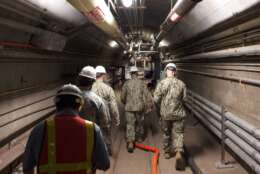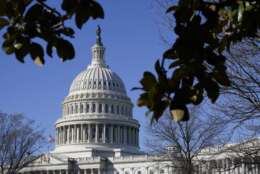On DoD
-
In today's Federal Newscast: GSA attempts some creative inflation-slashing tricks for contractors. Internet crime was a growth industry in 2021. And the number of federal contractors is shrinking.
March 23, 2022 -
Security clearances, how to get them what you can do with them is an ever-changing topic. And the last couple of years have brought quite a few changes, especially since the machinery moved from the Office of Personnel Management to the Defense Department.
March 22, 2022 -
In today's Federal Newscast, House lawmakers are pressing the Federal Aviation Administration for more details on what it's doing to ensure the safety of the air transportation system as commercial companies roll out 5G wireless services.
March 22, 2022 -
The program focuses on balance as a way of determining health.
March 21, 2022 -
Defense Department components often give grants or contracts to colleges and universities, and companies for that matter, to do research. Now the Defense Office of Inspector General has found, research contractors don't do a good job of protecting that information from cyber attacks.
March 21, 2022 -
Omnibus bill adds more than $1 billion in facility upkeep funding, an area DoD has knowingly neglected in its budgets for at least a decade.
March 21, 2022 -
DoD's new JADC2 implementation plan is still classified, but signs of it will start to appear in the forthcoming 2023 budget proposal.
March 21, 2022 -
The Coast Guard will establish a new rating next year called cyber mission specialist. Officials hope it will attract new recruits and strengthen the Coast Guard's ability to carry out its cyber mission.
March 18, 2022 -
In a March 16 memo, Deputy Defense Secretary Kathleen Hicks wrote that there will not be a “one-size-fits-all” plan to return to work.
March 17, 2022 -
Combining factors like lack of child care and constant moves are keeping spouses from holding jobs.
March 16, 2022 -
The latest intel authorization bill carries implications for security clearance reform, commercial geospatial-intelligence imagery efforts and what kind of work intelligence analysts can consider after leaving the U.S. government.
March 15, 2022 -
Congress, as it does every year, crammed a lot of spending when it whipped up that so called omnibus appropriations bill.
March 14, 2022 -
The House-Senate appropriations agreement leaves out a DoD request to significantly expand a pilot program to test "colorless" appropriations for software and technology development.
March 14, 2022 -
The $1.5 trillion spending bill, approved almost halfway through the fiscal year, is expected to be swiftly signed into law by the president.
March 10, 2022 -
Lawmakers are on the cusp of agreeing to a fiscal year 2022 spending agreement with a big increase for national defense.
March 10, 2022












